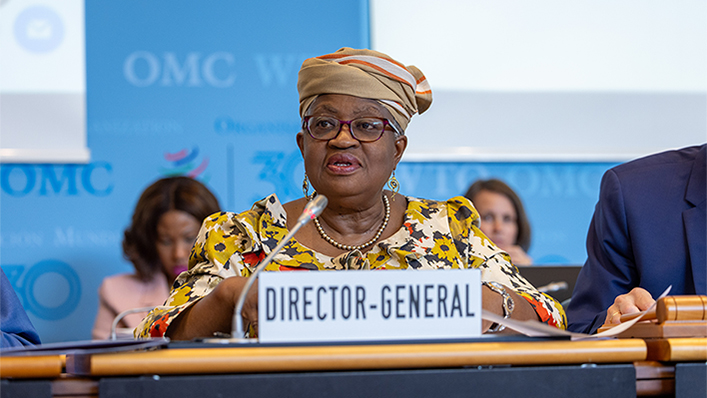
DG selection process
Members discussed the request from the African Group of members regarding the appointment of the Director General (WT/GC/W/948). The African Group requests that the current Director-General make herself available to serve a second term, and has proposed that the process of reappointing the Director-General should be started as soon as possible. The current term of DG Okonjo-Iweala finishes at the end of August 2025. She is eligible for a second four-year term.
Fifty-eight members, several speaking on behalf of groups of members, took the floor to comment and express their support for the African Group proposal. They called on DG Okonjo-Iweala to make her intentions known regarding a second term as soon as possible. Most of these members praised the DG’s hard work and her achievements during her first term.
DG Okonjo-Iweala said that she was very grateful for the show of support from members. “Everything that I’ve accomplished, we’ve accomplished together,” she said. The DG added that she took the call of members very seriously and was favourably inclined. She said she would get back to members very soon regarding her intentions.
The General Council Chair, Petter Ølberg (Norway), said that he heard unanimous, broad and strong support, both for the current DG to make herself available and to run again, and for the process to be started as soon as possible. The Chair said he will be reaching out to delegations in the days and weeks to come.
Agriculture
Brazil presented for adoption by the General Council its proposal “Moving Agriculture Negotiations Forward — Draft Decision” (WT/GC/W/939/Rev.2). The proposal sets out a work programme for achieving tangible progress and balanced outcomes in the agriculture negotiations by the 14th Ministerial Conference (MC14), which will take place in Cameroon.
Forty-three delegations took the floor on this item. Many delegations thanked Brazil for its work on the proposed work programme and voiced support for adoption of Brazil’s proposal, saying that the text could serve as a good common basis for negotiations to move ahead after the summer break. Others expressed concerns over the process and substance of the Brazil proposal, with some saying that better account needed to be taken of priorities highlighted by the African Group.
The Director-General said that people have expectations that the WTO can deliver on agriculture, and she noted that MC14 will take place on a continent where food security is a huge problem. She said she had detected some slight shifts in positions among some members that had not shifted before, and she suggested that members might need to mull over this issue during the summer break.
The Chair thanked Brazil for its efforts to find a way forward on this important subject matter. He concluded that there was no consensus at this time on the adoption of this decision. The Chair encouraged delegations to build on the constructive conversations and the small steps that have been made to move forward, and to continue their engagement after the WTO’s summer break.
Investment Facilitation for Development
On behalf of 125 proponent members, Chile presented “Incorporation of the Investment Facilitation for Development (IFD) Agreement into Annex 4 of the WTO Agreement — Draft Decision” (WT/GC/W/927/Rev.1) for General Council approval. The proponents requested the formal incorporation of the Investment Facilitation for Development Agreement into the WTO framework and stated their commitment to further discussions and consultations with all members on the issue.
Chile emphasized the importance of incorporating the IFD Agreement into the WTO to promote economic development, particularly for developing economies. Chile said that the IFD Agreement aligns with existing WTO agreements and does not create any obligations for members that are not parties to the Agreement.
Many members spoke in favour of the proposal, noting that it would mainly help developing economies and least-developed countries that are currently facing difficulties in attracting foreign investment. However, three members said that they were not in a position to agree to the proposal. The three said that they remain open to engaging with the proponents.
The Director-General said that the IFD Agreement is “low-hanging fruit” and that it is in line with the concept of “re-globalization”, which seeks to diversify, and involve more developing economies in, global supply chains. The IFD Agreement can also be seen as a de-risking investment, especially in smaller developing economies, she said.
The Chair noted the overwhelming support expressed for the draft decision. However, due to the objections of the three members, the General Council was not in a position to adopt the decision. The Chair noted the suggestion from some members that he help facilitate engagement, and said that he stands ready to do so if members would consider this helpful.
Other items
Procedure for the Introduction of Multiple Changes to the Harmonized System to Schedules of Concessions Using the Consolidated Tariff Schedules (CTS) Database
The General Council adopted a proposal (G/C/W/846) that aims to facilitate and simplify the introduction of Harmonized System (HS) nomenclature changes into members’ WTO schedules by making better use of the Consolidated Tariff Schedule (CTS) database.
Follow up to MC12 — Report on the MC12 SPS Declaration Work Programme adopted by the SPS Committee on 26 June 2024
The General Council formally approved the report, which was approved by the Committee on Sanitary and Phytosanitary Measures on 26 June, and endorsed the findings and recommendations contained therein.
The General Council meeting continues on 23 July.
Share
Reach us to explore global export and import deals